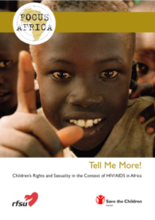Save the Children Sweden in collaboration with the Swedish Association for Sexuality Eduation (RFSU) have recently published a report documenting children’s opinions about the services and education they receive on sexuality and HIV/AIDS in sub-Saharan Africa. “Tell Me More: Children’s Rights and Sexuality in the Context of HIV/AIDS in Africa” found that young children are rarely targeted in work on HIV/AIDS prevention and sexual and reproductive health initiatives and they are rarely asked their opinions about the services they are provided. This report explores children’s perspectives and strategies for dealing with sexuality and relationships in the face of HIV/AIDS in sub-Saharan Africa.
It is evident that children have many strategies to avoid HIV/AIDS, the most popular being involvement in school or recreational activities. Children mentioned that strict gender norms make it difficult for boys and girls to negotiate sex and not fall into society’s expectations of their sexual behavior (boys to have multiple sexual partners and girls to be uninformed about sex and sexuality). These gender norms and societal pressure also encourage transactional and cross-generational sex, which are prevalent throughout Africa.
Children are concerned with the sexual health services available to them. They expressed a need for confidentiality, lower costs, and easier access in sexual health services. They prefer getting information about sexuality from younger people and those who discuss sexuality in a positive, non-judgmental way. At this stage, though, most children get information from the media.
Children found the sexuality education provided in schools and communities to be too technical, negative and moralistic. It does not address issues that concern them such as love, body image, relationships, identity and how to negotiate safe sex. Children found the focus on ABC (abstinence, be faithful and use condoms) to be simplistic, not well explained and unrealistic for them. Because adults are often uninformed themselves, shy and have strong moral ideas about what is right and wrong within the realm of sexuality, the education children receive is not explained very well, it is judgmental and does not help children understand how to deal with difficult issues like how to negotiate sex and condom use.
It is evident that there are huge gaps between what adults think children need to protect themselves, and what children themselves think. This discrepancy results in poorly-targeted programs and as a result, more children who fall prey to HIV.
“Tell Me More” is the latest in a series of reports produced by the Save the Children Sweden’s initiative “Focus Africa”. Focus Africa attempts to highlight pertinent issues affecting children in Africa and show examples of children’s resilience and communities’ creativity in tackling the struggles they face.
©Swedish Association for Sexuality Education

